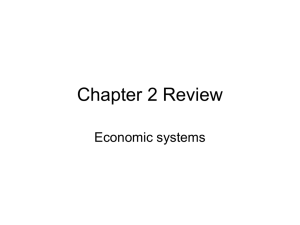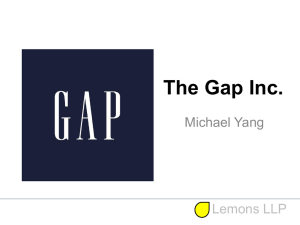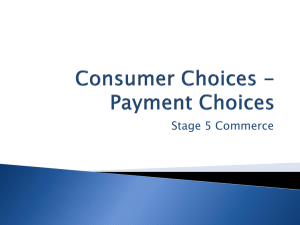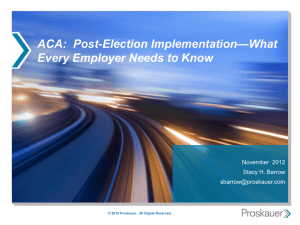Advantages and Disadvantages of a Registered Public Offering
advertisement
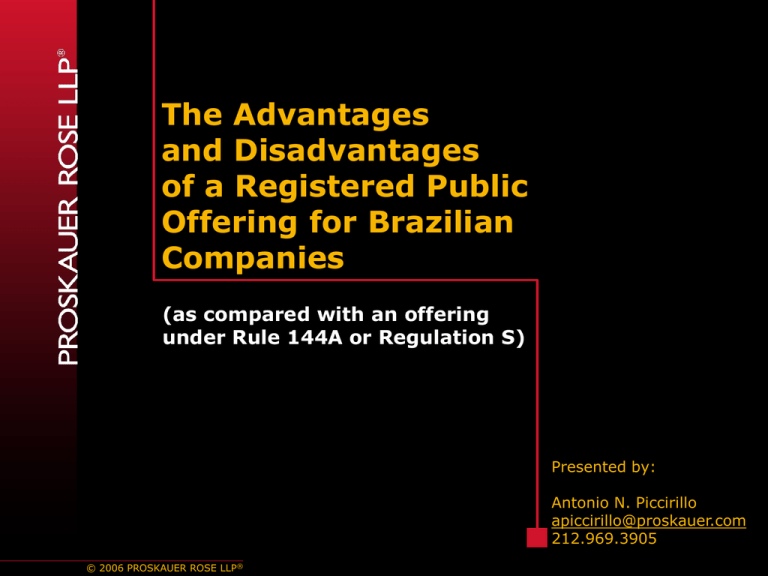
The Advantages and Disadvantages of a Registered Public Offering for Brazilian Companies (as compared with an offering under Rule 144A or Regulation S) Presented by: Antonio N. Piccirillo apiccirillo@proskauer.com 212.969.3905 © 2006 PROSKAUER ROSE LLP® The Advantages and Disadvantages of a Registered Public Offering for Brazilian Companies (as compared with an offering under Rule 144A or Regulation S) I. Overview II. Principal Characteristics and Differences III. Advantages and Disadvantages of a Registered Public Offering © 2006 PROSKAUER ROSE LLP® 1 I. Overview © 2006 PROSKAUER ROSE LLP® 2 PART I The Advantages and Disadvantages of a Registered Public Offering for Brazilian Companies (as compared with an offering under Rule 144A or Regulation S) A Brazilian company can raise capital in the US by offering: — Equity, or — Debt An equity offering may be conducted through the issuance of: — ADRs, or — Shares © 2006 PROSKAUER ROSE LLP® 3 PART I The Advantages and Disadvantages of a Registered Public Offering for Brazilian Companies (as compared with an offering under Rule 144A or Regulation S) ADRs and shares are normally offered under: — Registered Public Offerings, — Rule 144A Offerings, or — Regulation S Offerings © 2006 PROSKAUER ROSE LLP® 4 II. Principal Characteristics and Differences © 2006 PROSKAUER ROSE LLP® 5 PART II The Advantages and Disadvantages of a Registered Public Offering for Brazilian Companies (as compared with an offering under Rule 144A or Regulation S) What are ADRs? American Depositary Receipts Negotiable receipts registered in the name of the holder, evidencing a specified number of equity securities Issued by a US depositary (usually a bank) against the deposit of the Issuer’s securities with a custodian in the Issuer’s home country Allow the Issuer’s securities to be traded and settled in the manner customary in the US market © 2006 PROSKAUER ROSE LLP® 6 PART II The Advantages and Disadvantages of a Registered Public Offering for Brazilian Companies (as compared with an offering under Rule 144A or Regulation S) What are ADRs? (cont’d) Payments must be made in US dollars (regardless of whether payments on the underlying securities are made in Reais) Can be listed on US securities exchanges ADRs can be “Level I,” “Level II” or “Level III” ADRs can also be issued in (1) a private transaction in reliance on Rule 144A and (2) in an “offshore transaction” in reliance on Regulation S © 2006 PROSKAUER ROSE LLP® 7 PART II The Advantages and Disadvantages of a Registered Public Offering for Brazilian Companies (as compared with an offering under Rule 144A or Regulation S) Level I ADRs Issuer cannot raise new capital May be issued with or without the Issuer’s participation ADRs are not quoted on an exchange Depositary must file a short registration statement (Form F-6) with the SEC Issuer is not subject to SEC reporting requirements (but must obtain a Rule 12g32(b) exemption and file certain customary information, including all information sent to shareholders in Brazil) © 2006 PROSKAUER ROSE LLP® 8 PART II The Advantages and Disadvantages of a Registered Public Offering for Brazilian Companies (as compared with an offering under Rule 144A or Regulation S) Level II ADRs Issuer cannot raise new capital ADRs are quoted on an exchange Issuer files registration statement on Form 20-F Depositary must file a short registration statement (Form F-6) with the SEC Issuer is subject to SEC reporting requirements (including obligation to file an Annual Report on Form 20-F) and Sarbanes-Oxley Act © 2006 PROSKAUER ROSE LLP® 9 PART II The Advantages and Disadvantages of a Registered Public Offering for Brazilian Companies (as compared with an offering under Rule 144A or Regulation S) Level III ADRs Issuer raises new capital ADRs are quoted on an exchange Issuer files registration statement on Form F-1 Depositary must file a short registration statement (Form F-6) with the SEC Issuer is subject to SEC reporting requirements (including obligation to file an Annual Report on Form 20-F) and Sarbanes-Oxley Act © 2006 PROSKAUER ROSE LLP® 10 PART II The Advantages and Disadvantages of a Registered Public Offering for Brazilian Companies (as compared with an offering under Rule 144A or Regulation S) Overview of Rule 144A “A safe harbor” from registration under the Securities Act for resales of securities to Qualified Institutional Buyers (“QIBs”) Issuer issues securities to one or more investment banking firms in a traditional Section 4(2) private placement The investment banking firms then resells the securities to QIBs under the exemption provided by Rule 144A A QIB is an institution that in the aggregate owns or invests at least $100 million in securities of unaffiliated entities Other criteria apply for banks, savings and loan associations registered broker-dealers © 2006 PROSKAUER ROSE LLP® 11 PART II The Advantages and Disadvantages of a Registered Public Offering for Brazilian Companies (as compared with an offering under Rule 144A or Regulation S) Rule 144A Offerings of ADRs/Shares Issuer can raise new capital ADRs/Shares are not quoted on exchange Issuer is exempt from filing a registration statement with the SEC (but must apply for a Rule 12g3-2(b) exemption) Issuer is not subject to SEC reporting requirements (but must file certain customary information, including all information sent to shareholders in Brazil) © 2006 PROSKAUER ROSE LLP® 12 PART II The Advantages and Disadvantages of a Registered Public Offering for Brazilian Companies (as compared with an offering under Rule 144A or Regulation S) Rule 144A Offerings of ADRs/Shares (cont’d) Issuer does not have to apply for 12g3-2(b) exemption (or comply with the above filing requirements) if it provides to investors certain operational and financial information required under Rule 144A For ADR offerings the Depositary must file a short registration statement (Form F-6) with the SEC © 2006 PROSKAUER ROSE LLP® 13 PART II The Advantages and Disadvantages of a Registered Public Offering for Brazilian Companies (as compared with an offering under Rule 144A or Regulation S) Overview of Regulation S An exemption from the US registration requirements for offerings conducted in “offshore transactions”, where there are no “directed selling efforts” made in the United States © 2006 PROSKAUER ROSE LLP® 14 PART II The Advantages and Disadvantages of a Registered Public Offering for Brazilian Companies (as compared with an offering under Rule 144A or Regulation S) Overview of Regulation S (cont’d) Offshore Transaction No offer can be made to a person in the US Either the buyer must be outside the US, or the sale must be executed in, on or through the facilities of a “designated offshore securities market” Neither the seller nor any person acting on its behalf can know that the transaction has been pre-arranged with a buyer in the US © 2006 PROSKAUER ROSE LLP® 15 PART II The Advantages and Disadvantages of a Registered Public Offering for Brazilian Companies (as compared with an offering under Rule 144A or Regulation S) Overview of Regulation S (cont’d) No Directed Selling Efforts “Directed selling efforts” include any activity that is undertaken for the purpose of conditioning the market in the US (such as promotional seminars or advertisements) “Directed selling efforts” do not include routine corporate communications (such as press releases) © 2006 PROSKAUER ROSE LLP® 16 PART II The Advantages and Disadvantages of a Registered Public Offering for Brazilian Companies (as compared with an offering under Rule 144A or Regulation S) Regulation Offerings of S ADRs/Shares Issuer can raise new capital No directed selling efforts in the US ADRs/Shares are not quoted on a US exchange, but may be quoted on a foreign exchange Issuer does not file a registration statement with the US SEC, but may be required to do so by a foreign securities regulator © 2006 PROSKAUER ROSE LLP® 17 PART II The Advantages and Disadvantages of a Registered Public Offering for Brazilian Companies (as compared with an offering under Rule 144A or Regulation S) Regulation Offerings of S ADRs/Shares (cont’d) Issuer is not subject to SEC reporting requirements, but may be required to comply with foreign country’s rules and regulations Issuer may be required to apply for Rule 12g32(b) exemption if ADRs/Shares flow back into the US and are held by more than 300 persons in US and 500 persons overall © 2006 PROSKAUER ROSE LLP® 18 PART II The Advantages and Disadvantages of a Registered Public Offering for Brazilian Companies (as compared with an offering under Rule 144A or Regulation S) The Registered Public Offering Process A. Due Diligence B. The Registration Statement C. The Prospectus D. Going Effective E. Listing on an Exchange © 2006 PROSKAUER ROSE LLP® 19 PART II The Advantages and Disadvantages of a Registered Public Offering for Brazilian Companies (as compared with an offering under Rule 144A or Regulation S) Due Diligence Underwriters, their counsel and Issuer’s counsel conduct an extensive examination of the Issuer’s operations, including: — Discussions with senior management — Review of financial statements — Review of material contracts — Review of financing arrangements Helps underwriters to establish a record upon which to base their “due diligence defense” to liability under the US securities laws Also helps the Issuer’s counsel to draft an accurate and meaningful registration statement and prospectus © 2006 PROSKAUER ROSE LLP® 20 PART II The Advantages and Disadvantages of a Registered Public Offering for Brazilian Companies (as compared with an offering under Rule 144A or Regulation S) The Registration Statement In order to publicly issue ADRs (Level II and III ADRs) in the United States, an Issuer must file a registration statement with the SEC The registration statement must be approved by the SEC before any sales of securities take place The registration will consist primarily of: — a Prospectus (including Financial Statements) — Exhibits © 2006 PROSKAUER ROSE LLP® 21 PART II The Advantages and Disadvantages of a Registered Public Offering for Brazilian Companies (as compared with an offering under Rule 144A or Regulation S) The Registration Statement (cont’d) The Issuer typically has primary responsibility for preparing the first draft of the registration statement, which is then carefully reviewed and commented upon by underwriters When the registration statement is completed, it is filed with the SEC The registration statement must be declared effective by the SEC prior to the commencement of trading of the ADRs The three stages of the registration process are — Silent or pre-effective period — Registration period — Effective period © 2006 PROSKAUER ROSE LLP® 22 PART II The Advantages and Disadvantages of a Registered Public Offering for Brazilian Companies (as compared with an offering under Rule 144A or Regulation S) The Prospectus The prospectus is the offering document distributed by underwriters to potential investors The prospectus generally contains the following information (among others) regarding the Issuer: — detailed business description — selected financial data — risk factors — an “Operating and Financial Review and Prospects” discussion — directors, senior management and employees — ownership — disclosure regarding market sensitive instruments — other material information — financial statements © 2006 PROSKAUER ROSE LLP® 23 PART II The Advantages and Disadvantages of a Registered Public Offering for Brazilian Companies (as compared with an offering under Rule 144A or Regulation S) Consequences of Being a Public Company Once an Issuer has a class of shares registered with the SEC and listed on a US exchange (ADRs Levels II and III), the Issuer will be subject to: — Periodic Reporting Obligations: Annual Reports on Form 20-F Periodic Reports on Form 6-K — Reporting Obligations of Large Shareholders — Sarbanes – Oxley Compliance — Liability for Misleading Disclosure — Foreign Corrupt Practices Act — Regulation FD (“Fair Disclosure”) (on a voluntary basis) — Stock exchange rules and regulations © 2006 PROSKAUER ROSE LLP® 24 PART II The Advantages and Disadvantages of a Registered Public Offering for Brazilian Companies (as compared with an offering under Rule 144A or Regulation S) The Rule 144A/Reg S Offering Process The two exceptions from registration (Rule 144A and Reg S) can be used together to target investors in the US and abroad The main differences in relation to registered public offering process (Level II and III ADRs) are (1) a slightly quicker process (no SEC registration), (2) fewer disclosure requirements (3) restrictions on sales and (4) no listing on an exchange © 2006 PROSKAUER ROSE LLP® 25 PART II The Advantages and Disadvantages of a Registered Public Offering for Brazilian Companies (as compared with an offering under Rule 144A or Regulation S) Summary of the Main Characteristics of each Type of Offering Level I ADR Level II ADR Level III ADR Rule 144A Reg S Ability to Raise New Capital No No Yes Yes Yes Issuer Participation Generally Yes Yes Yes Yes Stock Exchange Availability No Yes Yes No No Form Issuer Files with SEC None Form 20-F Form F-1 None None Form Depositary Files with SEC F-6 F-6 F-6 F-6 None Issuer Subject to SEC Reporting Obligations No Yes Yes No No Selling Restrictions None None None QIBS Offshore Transactions © 2006 PROSKAUER ROSE LLP® 26 III.Advantages and Disadvantages of a Registered Public Offering © 2006 PROSKAUER ROSE LLP® 27 PART III The Advantages and Disadvantages of a Registered Public Offering for Brazilian Companies (as compared with an offering under Rule 144A or Regulation S) Advantages: Improved Access to Capital — Deeper market — Fewer restrictions on sales Facilitating Future Offerings — Access to “short-form” registration statements — Shelf registrations © 2006 PROSKAUER ROSE LLP® 28 PART III The Advantages and Disadvantages of a Registered Public Offering for Brazilian Companies (as compared with an offering under Rule 144A or Regulation S) Advantages: (cont’d) Improved corporate image Increased liquidity Ability to use shares for acquisitions Fewer restrictions on advertising and publicity Coverage of stock by analysts © 2006 PROSKAUER ROSE LLP® 29 PART III The Advantages and Disadvantages of a Registered Public Offering for Brazilian Companies (as compared with an offering under Rule 144A or Regulation S) Disadvantages: Significant Public Disclosure — SEC review — Reporting obligations Sarbanes-Oxley compliance — Corporate Governance — Internal controls — CEO/CFO certifications — Independent auditor rules © 2006 PROSKAUER ROSE LLP® 30 PART III The Advantages and Disadvantages of a Registered Public Offering for Brazilian Companies (as compared with an offering under Rule 144A or Regulation S) Disadvantages: (cont’d) Less Flexibility in Disclosure Document US GAAP financial statements More exposure to liability and litigation in the US More Expensive and Lengthier Process — SEC review — Attorney, auditor, filing, listing and printing fees Stock exchange rules © 2006 PROSKAUER ROSE LLP® 31 The Advantages and Disadvantages of a Registered Public Offering for Brazilian Companies (as compared with an offering under Rule 144A or Regulation S) Presented by: Antonio N. Piccirillo apiccirillo@proskauer.com 212.969.3905 © 2006 PROSKAUER ROSE LLP®

